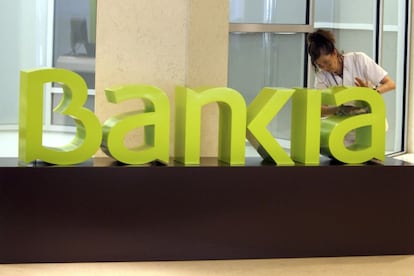Bankia to return money to all small investors in wake of top court ruling
Lender to give back stakes to minority shareholders who invested in its 2011 IPO

Bankia is to return the money that small investors spent on shares when the Spanish lender began listing on the stock exchange in 2011.
By providing refunds with an annual interest of one percent, the nationalized bank is hoping to avoid an avalanche of lawsuits in the wake of a recent Supreme Court decision.
By providing refunds, the bank is hoping to avoid an avalanche of lawsuits in the wake of the recent Supreme Court decision
In late January, the Supreme Court ruled that Bankia had to return the money spent by two individuals on its shares. The ruling was based on the fact that the bank’s Initial Public Offering (IPO) filings contained “serious inaccuracies” regarding the true state of the lender’s finances at the time of its stock market launch.
Aware that this setback paves the way for legal action by thousands of angry investors, Bankia has decided to settle out of court. Bank sources have admitted that the lawyers’ fees involved in dealing with so many potential lawsuits alone could reach as much as €500 million.
“Bankia will return to minority shareholders the full amount of their original investment in exchange for the shares,” said the company in a filing with the regulatory body, the CNMV. “In the event that they have sold the shares, they will receive the difference between their investment and what they made from the sale. In both cases, the bank will pay compensatory interest of an annual one percent covering the period that elapsed until the refund.”
The bank admitted that this decision was triggered by the recent Supreme Court decision, and claimed that its refund system would benefit small investors who regret having placed their money in Bankia.
Bank sources have said that the lawyers’ fees involved in dealing with the lawsuits alone could reach €500 million
“They will get their funds back in a period of time that we estimate to be no longer than 15 days after the claim is filed; second, it will save them money by avoiding the legal process, or by reducing legal processes already underway,” said the lender.
Bankia had to be taken over by the government’s Orderly Bank Restructuring Fund (FROB) in May 2012, less than a year after listing on the stock exchange.
The bank came unstuck because of its overexposure to the ailing real estate sector. Before being taken over, the group initially reported a profit for 2011. However, after it was nationalized, its accounts were revised and the state had to inject over €22 billion to shore up its balance sheet, with the bank receiving the bulk of a European bailout.
English version by Susana Urra.
Tu suscripción se está usando en otro dispositivo
¿Quieres añadir otro usuario a tu suscripción?
Si continúas leyendo en este dispositivo, no se podrá leer en el otro.
FlechaTu suscripción se está usando en otro dispositivo y solo puedes acceder a EL PAÍS desde un dispositivo a la vez.
Si quieres compartir tu cuenta, cambia tu suscripción a la modalidad Premium, así podrás añadir otro usuario. Cada uno accederá con su propia cuenta de email, lo que os permitirá personalizar vuestra experiencia en EL PAÍS.
¿Tienes una suscripción de empresa? Accede aquí para contratar más cuentas.
En el caso de no saber quién está usando tu cuenta, te recomendamos cambiar tu contraseña aquí.
Si decides continuar compartiendo tu cuenta, este mensaje se mostrará en tu dispositivo y en el de la otra persona que está usando tu cuenta de forma indefinida, afectando a tu experiencia de lectura. Puedes consultar aquí los términos y condiciones de la suscripción digital.








































